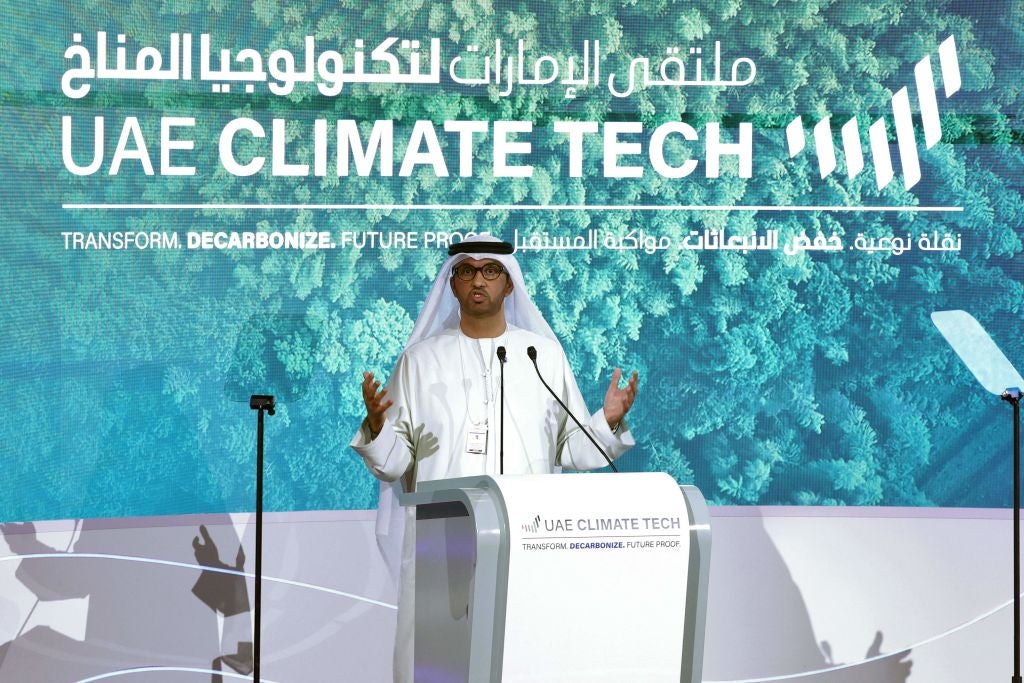
More than 100 members of the US Congress and the European Parliament have signed a letter calling for the UN Framework Convention on Climate Change (UNFCCC) to address the persistent interference of the fossil fuel industry in annual UN climate meetings (“COPs”).
They have asked for the withdrawal of Sultan Al Jaber as chair of the next COP – COP28 in the United Arab Emirates (UAE) in November – as they fear his appointment could undermine the climate negotiations. In January, the UAE confirmed that Al Jaber, who is also the chief executive of one of the world’s biggest oil producers, would be appointed as president of COP28.
“Ahead of the annual Conference of the Parties (COP28) climate negotiations, enacting policies that expose the influence of corporate polluters in UNFCCC meetings will help ensure that climate science takes precedence over climate delay and greenwashing,” said the letter, which was initiated by French politician Manon Aubry and US Democratic Senator Sheldon Whitehouse.
The letter is addressed to US President Joe Biden and President of the European Commission Ursula von der Leyen, in addition to UN leaders. It urges for the withdrawal of Al Jaber and for world leaders to “take immediate steps to limit the influence of polluting industries, particularly major fossil fuel industry players whose business strategies lie at clear odds with the central goals of the Paris Agreement, at gatherings of the UNFCCC”.
COP27 made historical progress to agree on funds for loss and damage from climate change, but the negotiations failed to achieve much on the task of reducing greenhouse gas emissions. At least 636 fossil fuel lobbyists attended COP27, according to research by the non-profit Global Witness, with the UAE having more lobbyists in its delegation than any other country. The year before, at COP26, more than 100 fossil fuel companies were present with over 503 delegates at the conference having connections to the fossil fuel industry.
“It did not escape our attention that at least 636 lobbyists from the oil and gas industries registered to attend last year’s COP – an increase of more than 25% over the previous year,” reads the letter. “When the number of attendees representing polluting corporate actors, which have a vested financial interest in maintaining the status quo, is larger than the delegations of nearly every country in attendance, it is easy to see how their presence could obstruct climate action.”
How well do you really know your competitors?
Access the most comprehensive Company Profiles on the market, powered by GlobalData. Save hours of research. Gain competitive edge.

Thank you!
Your download email will arrive shortly
Not ready to buy yet? Download a free sample
We are confident about the unique quality of our Company Profiles. However, we want you to make the most beneficial decision for your business, so we offer a free sample that you can download by submitting the below form
By GlobalDataAl Jaber’s appointment as president has been controversial from the start, with climate leaders and civil rights groups reacting with dismay. However, some have argued that his appointment is an opportunity to fast-forward the clean energy transition because fossil fuel-focused countries and companies have to be part of the solution.
This month, it was reported that the UAE will welcome Syrian President Bashar al-Assad – whose regime is still sanctioned by some countries over Syria’s brutal civil war – to COP28, which led to fresh criticism from human rights organisations such as Amnesty and Human Rights Watch.
Al Jaber has objected to the criticism over his role as leader of the climate conference, telling Reuters in February: “How about for once we capitalise on everybody’s capabilities and strengths and fight climate change rather than going after each other.”






